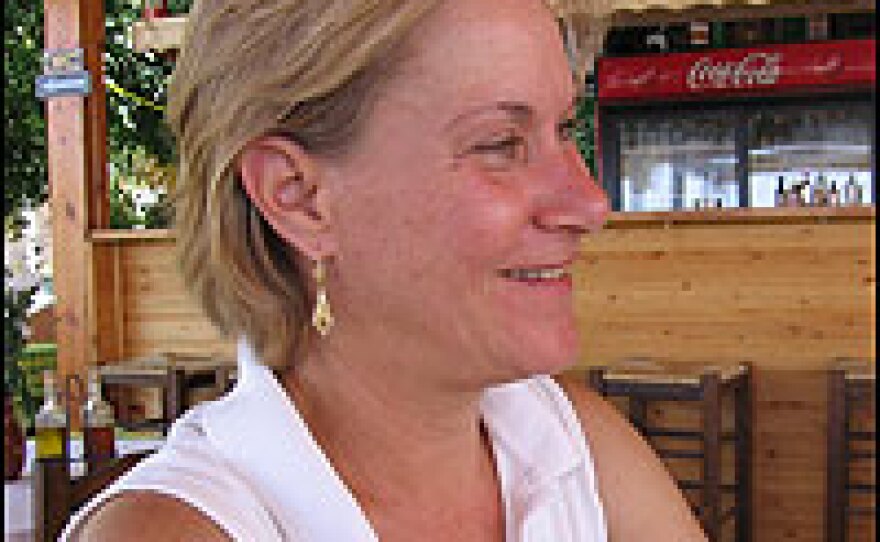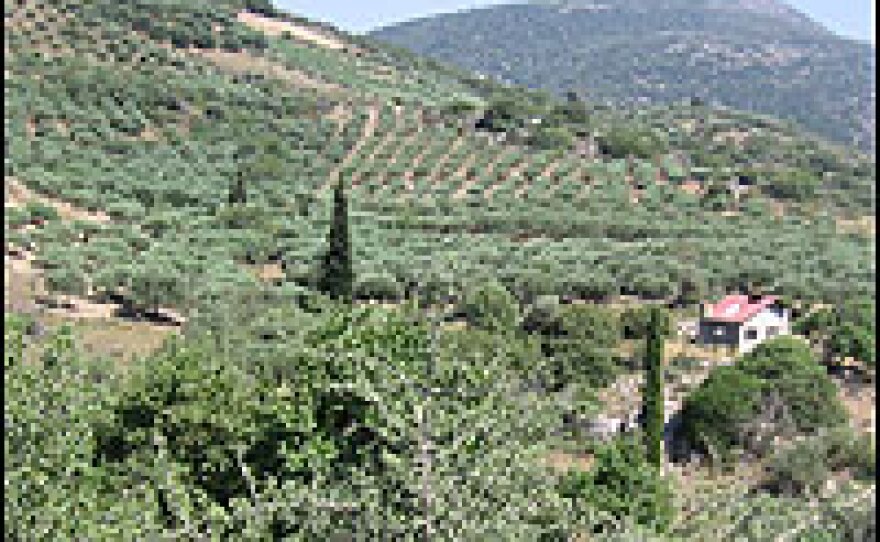
When Hitler's armies and Axis powers occupied Greece during World War II, they pretty much stripped Greece of its food, which was sent to German soldiers on battle fronts across Europe.
By the end of the war, at least a quarter of a million Greek men, women and children had died from starvation.
Rebuilding a Starving Nation
Just three years after the war, American scientists arrived on the Greek island of Crete to help rebuild. The wartime survivors still scraped by on the tiniest portions of food, so the scientists were amazed by what they saw.
Scientists found the people of Crete in excellent health even after the war, explained Dr. Anthony Kafatos of the University of Crete's School of Medicine. He said that after the war, there was no malnutrition.
And when compared with people in wealthy America, people in Crete were healthier — by far.
Kafatos said it had to do with diet: Although people had little food, what they had was fresh, in season and often what they grew themselves.
"The families here in Crete, they produced everything they wanted at home," Kafatos said. "And they had no supermarkets, no electricity, no refrigerator. So they had only seasonal foods."
The Good Kind of Fat
It was a diet with lots of fruit, vegetables, bread, cereals and fish. Also a lot of fat. But in Crete, it wasn't what nutritionists would later call "bad fat."
Kafatos said for that balance, Greeks can thank the Greek Orthodox Church and its requirement for fasting.
"One hundred and eighty days per year, half a year, they have no animal products — no meat, no eggs no dairy products."
Instead, people in Crete got most of their fat from the olive groves that covered much of the island. They used more olive oil than any other place in the world.
Another team of American scientists — this time nutritionists — arrived in 1960 to follow men who survived war. Through the first 10 years of their study, not one man died of a heart attack. The first death from a heart attack would come years later, and he was a village butcher. Cancer, too, was rare.
A Model Diet
Those findings became the basis for what today we call the "Mediterranean Diet." It's considered one of the best in the world and a model for dietary guidelines put out by the U.S. government.
In Crete today, a large number of those wartime survivors are alive and still healthy, like 90-year-old Costas Pinakoulakis. He lives in a tiny hillside village, near the villages first studied by those American nutritionists.
On a recent summer night, he and his wife served dinner to friends. They eat outside in their small courtyard. Pinakoulakis is proud that almost every bite of food spread out on the table has come from his own groves and gardens — the cherries and olives; the wine pressed from his own grapes; the hard, salty cheese made with his own hands.
Losing a Tradition
But now, that kind of homegrown eating is vanishing.
In a large supermarket in Heraklion — Crete's biggest city — you get a sense of what has changed. Maria Strataki goes through the checkout line with a basket filled with fruit. She got some locally grown food — the watermelon and honeydew grown in Crete. But she also bought apples flown in from Chile and grapes from Italy.
Strataki said she shops here because it's easy. Everything is in one store and there's parking. And on a hot day, with the temperature over 100 degrees, this store is air-conditioned.
A Changing Way of Life
In Crete, many women now work outside the home. Everyone is busier. Few people have time to make their own cheese anymore, and that's true in Crete, but also in the United States and pretty much everywhere. It's quicker, easier and cheaper to buy packaged and processed cheese at the supermarket.
At the University of Crete, Kafatos has continued the work of the American nutritionists who came here almost 50 years ago. He worries about the way people in Crete eat and live today.
"They have supermarket and fast-food chains, now, all over," he said. "They have the television, sitting for many hours in front of the television; no physical activity, a lot of food — bad quality food."
As a result, people in Crete can no longer claim to be healthier than people in the United States. Most people in Crete no longer follow the healthy eating and exercise patterns of their grandparents.
In a study Kafatos did last year, he found half the women in Crete obese and almost 40 percent of the men. According to another study, 40 percent of kids are obese, as well. And smoking is a problem: About half of adults smoke.
Kafatos nods toward the building next door. It's the new hospital built in the 1990s with a wing to treat people — often young men — who have had heart attacks.
In post-war Crete, heart disease was rare.
"It was an unknown disease," Kafatos said. "And now if you go to next hospital, here the corridors are full of patients 40 and 50 years old. So it's a dramatic change, I would say."
Preserving Health
There are some people trying to preserve Crete's healthy way of eating, like restaurant owners, food-makers and nutritionists who live in Crete. And, an American professional chef named Nikki Rose.
At a restaurant near her home in a seaside town, she talked of her work as a kind of culinary preservationism.
Professional chefs, dieticians and others interested in food come to Crete from around the world, and Rose introduces them to cheesemakers and people who still bake bread in 200-year-old brick ovens.
"What I do here is to salute the people that are still taking the time — precious time — to make cheese, to produce honey," she said. "I bring visitors to them so that they can share their knowledge, so that maybe people who go back to their own country can apply what they learn here."
But Rose knows what people eat and how what they eat is changing. That even in Crete, it's hard to find people adhering to the Mediterranean diet.
"It's a lifestyle that's fast disappearing," Rose said. "You can't package 'Mediterranean' in a box and take seven steps to health and happiness by buying olive oil and drinking wine."
Scientists studied village life in Crete and made us understand just how much of what we eat affects our health. Now modern life in Crete is teaching that diet is only one part of a healthy lifestyle.
Copyright 2022 NPR. To see more, visit https://www.npr.org. 9(MDAzMjM2NDYzMDEyMzc1Njk5NjAxNzY3OQ001))







